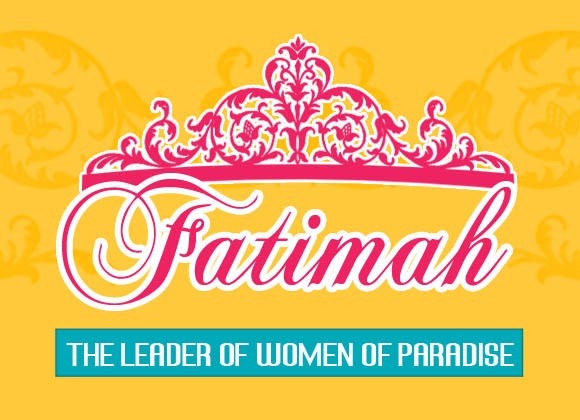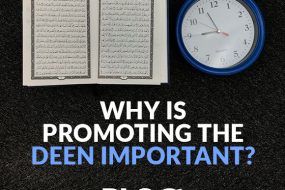
1. She was the youngest daughter of the Prophet ![]() and his favorite. 1
and his favorite. 1
2. A great event that shook the entire city of Makkah and that almost caused a war among its different tribes occurred in the same year that Faitimah ![]() was born. That was when the Ka’bah was being rebuilt.
was born. That was when the Ka’bah was being rebuilt.
Among the poetic passages composed regarding this event were those of Abu Wahab alMakhzoomi whose meaning goes as follows:
“The tribes quarreled with one another regarding a best plan;
And this quarrel almost caused a misfortune after happiness.
Because of this, mutual hatred replaced mutual love and the fire of war was kindled.
When we noticed that the matter was getting worse and the people were unsheathing their swords against one another;
We agreed that arbitration should be given to the first person who entered with no prior arrangement;
The first person to suddenly enter was Muhammad, the trustworthy; and we said: ‘We are pleased with Muhammad, the trustworthy.’
The entire city of Makkah felt that Muhammad put an end to their disagreement and made the
leaders of every clan participate in the honor of carrying the Black Stone.
It was as if all the clans had carried it.”
3. He ![]() nicknamed her az-Zahra’ (The splendid one). 2
nicknamed her az-Zahra’ (The splendid one). 2
4. A’isha ![]() narrated regarding Fatimah
narrated regarding Fatimah ![]() : “She bore a remarkable resemblance to Allah’s Messenger
: “She bore a remarkable resemblance to Allah’s Messenger ![]() . Her way of speaking, sitting, standing and walking – in other words all her manners and gestures were exactly like his.” 3
. Her way of speaking, sitting, standing and walking – in other words all her manners and gestures were exactly like his.” 3
5. Faatimah ![]() grew up amid the great love from her father and an abundant compassion from her mother. [Since the sisters of Fatimah
grew up amid the great love from her father and an abundant compassion from her mother. [Since the sisters of Fatimah ![]() were married, she was the only child at home]. She saw the great Prophetic quality that her father
were married, she was the only child at home]. She saw the great Prophetic quality that her father ![]() enjoyed, for his Lord had refined him and did so excellently. She was also impacted by her mother’s pure qualities and praiseworthy attributes. 4
enjoyed, for his Lord had refined him and did so excellently. She was also impacted by her mother’s pure qualities and praiseworthy attributes. 4
6. “…and you might wonder why Fatimah ![]() was the one who perfected her faith and what about her older sisters. There are a couple of reasons for it that the ‘ulema mentioned. One of them is that she spent the most time with Khadijah
was the one who perfected her faith and what about her older sisters. There are a couple of reasons for it that the ‘ulema mentioned. One of them is that she spent the most time with Khadijah ![]() , her mother, another woman who perfected her faith. And so, she adopted her morals and her character more than anyone else.
, her mother, another woman who perfected her faith. And so, she adopted her morals and her character more than anyone else.
Another reason is that she was with the Prophet ![]() in times when no one else was with him.”5
in times when no one else was with him.”5
7. She was five years old when the first revelation came to her father from Allah, the Exalted. 6
8. Zeal for the defense of what is sacred and love of the righteous was ingrained in her. 7
9. Among the things that prove her virtue is that which was reported in al-Saheehayn from ‘Abd-Allah ibn Mas’ood, that the Prophet ![]() used to pray at the Ka’bah, and Abu Jahl and his companions were sitting there. They said to one another, ‘Who will bring the intestines of the camel of so and so and put it on Muhammad’s back when he prostrates?’ So the most wretched of people went and brought it and waited until the Prophet
used to pray at the Ka’bah, and Abu Jahl and his companions were sitting there. They said to one another, ‘Who will bring the intestines of the camel of so and so and put it on Muhammad’s back when he prostrates?’ So the most wretched of people went and brought it and waited until the Prophet ![]() prostrated, then he put it on his back, between his shoulders. I was watching but I could not help him because I did not have any power. They started laughing and leaning against one another (because of their laughter), and the Messenger of Allah
prostrated, then he put it on his back, between his shoulders. I was watching but I could not help him because I did not have any power. They started laughing and leaning against one another (because of their laughter), and the Messenger of Allah ![]() was prostrating and did not raise his head until Faatimah
was prostrating and did not raise his head until Faatimah ![]() came and removed it from his back. Then the Messenger of Allah
came and removed it from his back. Then the Messenger of Allah ![]() raised his head, and said, ‘O Allah, deal with Quraysh,’ three times. They became worried when he prayed against them, because they used to believe that du’aa’s made in that land would be answered…”8
raised his head, and said, ‘O Allah, deal with Quraysh,’ three times. They became worried when he prayed against them, because they used to believe that du’aa’s made in that land would be answered…”8
10. The Messenger of Allah ![]() and his Companions were being daily persecuted by the Quraysh. Fatimah
and his Companions were being daily persecuted by the Quraysh. Fatimah ![]() also experienced pains of the polytheists’ denial of her father whom she greatly loved. The apex of the pains she experienced (at the very tender age of ten 9 ) since the beginning of the Da’wah was that vicious boycott in which the Muslims were boycotted, along with members of Banu Hashim clan, in the valley of Abu TaIib.10
also experienced pains of the polytheists’ denial of her father whom she greatly loved. The apex of the pains she experienced (at the very tender age of ten 9 ) since the beginning of the Da’wah was that vicious boycott in which the Muslims were boycotted, along with members of Banu Hashim clan, in the valley of Abu TaIib.10
During this period she showed exemplary courage, but this terrible time left an effect on her health which lasted till the end of her life 11
11. Soon after the siege was lifted, Fatimah ![]() went through the trauma of losing beloved Khadijah
went through the trauma of losing beloved Khadijah ![]() . 12
. 12
Fatimah ![]() was really forbearing. She doubled her efforts, bore the difficult events with patience and endured hoping to get her reward from Allah. She stood beside her father to compensate him for what he lost through the death of her mother, the most precious mother and the noblest wife. And the Messenger of Allah
was really forbearing. She doubled her efforts, bore the difficult events with patience and endured hoping to get her reward from Allah. She stood beside her father to compensate him for what he lost through the death of her mother, the most precious mother and the noblest wife. And the Messenger of Allah ![]() gave his daughter, Fatimah
gave his daughter, Fatimah ![]() abundant love, affection, compassion and care.13
abundant love, affection, compassion and care.13
12. Fatimah ![]() migrated in the company of her sisters, Ruqayyah
migrated in the company of her sisters, Ruqayyah ![]() and Umm Kulthoom
and Umm Kulthoom ![]() , and her step-mother, the mother of the faithful Sawdah bint Zam’ah
, and her step-mother, the mother of the faithful Sawdah bint Zam’ah ![]() . [At that time, Fatimah
. [At that time, Fatimah ![]() was an eighteen-year old young lady] 14
was an eighteen-year old young lady] 14
13. A’isha ![]() said that she never saw anyone more devoted to the truth than Fatimah
said that she never saw anyone more devoted to the truth than Fatimah ![]() . She stood shoulder to shoulder with the other Muhajir and Ansar women of Makkah and Al-Madinah tending to the injured and the dying in the Battle of Uhud. 15
. She stood shoulder to shoulder with the other Muhajir and Ansar women of Makkah and Al-Madinah tending to the injured and the dying in the Battle of Uhud. 15
14. She was married to ‘Ali ibn Abi Taalib ![]() in Safar 2 AH. She bore him al-Hasan, al-Husayn, Umm Kalthoom and Zaynab. 16
in Safar 2 AH. She bore him al-Hasan, al-Husayn, Umm Kalthoom and Zaynab. 16
‘Ali ![]() is one of the ten Companions who were given the glad tidings of Paradise, the first young boy to accept Islam and a member of the six-men Shoura Council. 17
is one of the ten Companions who were given the glad tidings of Paradise, the first young boy to accept Islam and a member of the six-men Shoura Council. 17
The Messenger of Allah ![]() said about him, “He who I regard a friend is also a friend of ‘Ali. 0 Allah, treat as a friend whoever regards ‘Ali a friend and treat as enemy whoever regards him an enemy.” 18
said about him, “He who I regard a friend is also a friend of ‘Ali. 0 Allah, treat as a friend whoever regards ‘Ali a friend and treat as enemy whoever regards him an enemy.” 18
15. She ![]() never annoyed her husband, ‘Ali
never annoyed her husband, ‘Ali ![]() . She bore the difficulties of life with him. She took excellent care of her children. She would perform the household chores and carry out her obligations as a responsible mother. 19
. She bore the difficulties of life with him. She took excellent care of her children. She would perform the household chores and carry out her obligations as a responsible mother. 19
16. ‘Ali ![]() narrated: Faatimah
narrated: Faatimah ![]() complained about the pain caused to her hand by the mill, and some prisoners had been brought to the Prophet
complained about the pain caused to her hand by the mill, and some prisoners had been brought to the Prophet ![]() , so she went but did not find him, but she met ‘Aa’ishah
, so she went but did not find him, but she met ‘Aa’ishah ![]() and told her. When the Prophet
and told her. When the Prophet ![]() came, ‘A’isha
came, ‘A’isha ![]() told him about Faatimah
told him about Faatimah ![]() coming to her. The Prophet
coming to her. The Prophet ![]() came to us, and we had gone to bed. We started to get up, but the Prophet
came to us, and we had gone to bed. We started to get up, but the Prophet ![]() said: “Stay where you are.” Then he sat between us, until I could feel the coolness of his foot on my chest. Then he said: “Shall I not teach you something better than what you asked for? When you go to your bed, magnify Allah thirty-four times, glorify Him thirty three times and praise Him thirty-three times. That is better for you than a servant.” 20
said: “Stay where you are.” Then he sat between us, until I could feel the coolness of his foot on my chest. Then he said: “Shall I not teach you something better than what you asked for? When you go to your bed, magnify Allah thirty-four times, glorify Him thirty three times and praise Him thirty-three times. That is better for you than a servant.” 20
Fatimah ![]() returned with greater confidence in Allah
returned with greater confidence in Allah ![]() that He would give her great reward for her patience. 21
that He would give her great reward for her patience. 21
17. The Messenger of Allaah ![]() said: “Faatimah
said: “Faatimah ![]() is a part of me, and whoever angers her, angers me.” 22
is a part of me, and whoever angers her, angers me.” 22
Ibn ‘Abdullah ![]() writes that whenever the Prophet
writes that whenever the Prophet ![]() came back from any journey or after taking part in a battle, he would first go to his Mosque in Al-Madinah and pray two Rak’at (units), then he would visit Fatimah
came back from any journey or after taking part in a battle, he would first go to his Mosque in Al-Madinah and pray two Rak’at (units), then he would visit Fatimah ![]() and then visit the wives in his household. 23
and then visit the wives in his household. 23
18. Allah’s messenger ![]() said: “One day Angel came and told me the glad tiding that Fatimah
said: “One day Angel came and told me the glad tiding that Fatimah ![]() will be the leader of women of Paradise.” 24
will be the leader of women of Paradise.” 24
19. ‘Aa’ishah (![]() ) said: “Faatimah
) said: “Faatimah ![]() came walking in the manner of the Prophet
came walking in the manner of the Prophet ![]() . The Prophet
. The Prophet ![]() said, ‘Welcome, O my daughter.’ Then he seated her to his right or to his left, then he said something privately to her and she wept. I said to her, ‘Why are you weeping?’ Then he said something privately to her and she smiled. I said, ‘I have never seen anything like that which I have seen today, of joy so close to grief.’ I asked her what he had said, and she said, ‘I would not disclose the secret of the Messenger of Allah
said, ‘Welcome, O my daughter.’ Then he seated her to his right or to his left, then he said something privately to her and she wept. I said to her, ‘Why are you weeping?’ Then he said something privately to her and she smiled. I said, ‘I have never seen anything like that which I have seen today, of joy so close to grief.’ I asked her what he had said, and she said, ‘I would not disclose the secret of the Messenger of Allah ![]() .’ When the Prophet
.’ When the Prophet ![]() passed away, I asked her and she said, ‘He told me, “Jibreel used to review the Qur’an with me once every year, but this year he has reviewed it with me twice, so I know that my appointed time (of death) is approaching. And you will be the first of my family to join me.” So I wept. Then he said, “Would it not please you to be the leader of the women of Paradise or the women of the believers?” So I smiled.’” 25
passed away, I asked her and she said, ‘He told me, “Jibreel used to review the Qur’an with me once every year, but this year he has reviewed it with me twice, so I know that my appointed time (of death) is approaching. And you will be the first of my family to join me.” So I wept. Then he said, “Would it not please you to be the leader of the women of Paradise or the women of the believers?” So I smiled.’” 25
This hadeeth categorically proves that the Prophet ![]() knew about the nearness of his death, and he intimated that knowledge to one person only- his daughter, Faatimah
knew about the nearness of his death, and he intimated that knowledge to one person only- his daughter, Faatimah ![]() . No other Muslim shared that knowledge with Faatimah
. No other Muslim shared that knowledge with Faatimah ![]() until after the death of the Messenger of Allah
until after the death of the Messenger of Allah ![]() . 26
. 26
20. Faatimah ![]() died six months after the Prophet
died six months after the Prophet ![]() . She was the first member of his family to join him, as he
. She was the first member of his family to join him, as he ![]() said she would be. 27
said she would be. 27
In his book Asad Al-Ghaabah, Ibn Atheer writes that after the Prophet ![]() passed away, no one ever saw Fatimah
passed away, no one ever saw Fatimah ![]() smile. And her grief remained visible on her face till she passed away, six months later. 28
smile. And her grief remained visible on her face till she passed away, six months later. 28
21. The true female leader is the one with whom her Rabb is pleased and whose deeds He accepts. The best women are those who attain the Paradise of delights. The women of Paradise are of different levels, and the Messenger ![]() told us about their leaders:
told us about their leaders:
He said, “The best women of Paradise are Khadeejah bint Khuwaylid, Faatimah bint Muhammad, Maryam bint ‘Imraan and Aasiyah bin Muzahim, the wife of Fir’awn” [Silsilat al-Hadith as-Saheehah, 4/13, no. 1508, from Ahmad at-Tahhaawi, al-Haakim from Ibn ‘Abbaas, saheeh]
Faatimah az-Zahraa ![]() , the daughter of the Prophet
, the daughter of the Prophet ![]() was patient and forbearing, and feared Allah
was patient and forbearing, and feared Allah ![]() . She was a branch from the pure tree, brought up by the educator of humanity. 29
. She was a branch from the pure tree, brought up by the educator of humanity. 29
Editor’s Note:
The age and dates mentioned in the poster are approximate numbers. Researchers slightly differ in the dates and age of the events that took place in the life of Fatimah ![]()
References:
- “Great Women of Islam”, by Mahmood Ahmad Ghadanfar, p. 147 ↩
- Women Around the Messenger”, by Muhammad ‘Ali Qutb, p. 309-312 ↩
- “Great Women of Islam”, by Mahmood Ahmad Ghadanfar, p. 145 ↩
- Women Around the Messenger”, by Muhammad ‘Ali Qutb, p. 313 ↩
- Quran Weekly video “Faatimah Daughter of Prophet Muhammad”, by Omar Suleiman ↩
- Women Around the Messenger”, by Muhammad ‘Ali Qutb, p. 335 ↩
- “Great Women of Islam”, by Mahmood Ahmad Ghadanfar, p. 147 ↩
- Narrated by al-Bukhaari, 233; Muslim, 3349 ↩
- “Great Women of Islam”, by Mahmood Ahmad Ghadanfar, p. 147-148 ↩
- Women Around the Messenger”, by Muhammad ‘Ali Qutb, p. 317 ↩
- “Great Women of Islam”, by Mahmood Ahmad Ghadanfar, p. 147-148 ↩
- “Great Women of Islam”, by Mahmood Ahmad Ghadanfar, p. 152 ↩
- Women Around the Messenger”, by Muhammad ‘Ali Qutb, p. 318 ↩
- Women Around the Messenger”, by Muhammad ‘Ali Qutb, p. 318, 319 ↩
- “Great Women of Islam”, by Mahmood Ahmad Ghadanfar, p. 148 ↩
- See al-Bidaayah wa’l-Nihaayah by Ibn Katheer, 5/321; Zaad al-Ma’aad, by Ibn al-Qayyim, 1/100 ↩
- Women Around the Messenger”, by Muhammad ‘Ali Qutb, p. 325 ↩
- The hadith is classified as saheeh, by Shaykh al-Albaani; see: as-Silsilah as-Saheeh, hadith no. 1750 ↩
- Women Around the Messenger”, by Muhammad ‘Ali Qutb, p. 327, 337 ↩
- Narrated by al-Bukhaaree (3502) and Muslim (2727) ↩
- Women Around the Messenger”, by Muhammad ‘Ali Qutb, p. 328 ↩
- Narrated by al-Bukhaaree, 3437; Muslim, 4483 ↩
- “Great Women of Islam”, by Mahmood Ahmad Ghadanfar, p. 158 ↩
- “Great Women of Islam”, by Mahmood Ahmad Ghadanfar, p. 145 ↩
- Narrated by al-Bukhaari, al-Manaaqib, 3353 ↩
- Refer to Maradun-Nabee Wa-Wafaatihi, p. 35 ↩
- See al-Bidaayah wa’l-Nihaayah by Ibn Katheer, 5/321; Zaad al-Ma’aad, by Ibn al-Qayyim, 1/100 ↩
- “Great Women of Islam”, by Mahmood Ahmad Ghadanfar, p. 159 ↩
- al-Jannah wa an-Naar (In the Light of the Qur’aan and Sunnah), Based on the Book by Dr. Umar Sulaiman al-Ashqar, pg. 79,80 ↩








6 replies on “The Best Generation: Fathimah (May Allah be pleased with her)”
“thumbs up” simply love the idea of using infographics design.
Hazrat Fatima r.a.had 3rd son named muhsin who died very early
Hi
May I ask if I could use this beautiful info graph in our website? and of course with your name on it.
thanks
Walaikum assalam
Of course you can inshaAllah 🙂
Hi
I wondered if we could use your infographs in our own website with your name on it
thanks
Masha Allah beautiful and well detailed article. I have two curious questions:
Was Fatima az-Zahra (radiy Allahu anha) the only daughter of Prophet Muhammad (Sallallahu alaihi wasallam) or were zainab, ruqaya and umm kulthum also biological daughetrs of the Prophet?
Also how did Imam Hasan (Radiy Allahu anhu) get martydom?
Jazak Allahu khair.